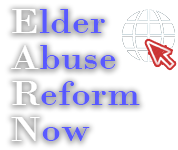
KEEPING OUR OLDER YEARS GOLDEN
Presently, in this country, all the planning in the world will not guarantee safety in your golden years. However, neglecting to make plans, to have discussions with those closest to you, and to take every legal step possible, does guarantee that you have a good chance of joining the approximately 5 million American citizens who are victims of elder abuse each year, and well as the millions more who suffer the unbearable sorrow of involuntary guardianship.
Twenty-nine states do not have a laws where “elder” is defined as a particular age (usually 60 or 65). Instead, those states limit their protection to individuals who are “vulnerable”, “impaired” or “dependent” adults. This reduces the chance that a case of financial elder abuse (the most frequent form of elder abuse other than neglect) will be prosecuted because district attorneys’ offices are already overburdened—as San Diego Assistant District Attorney Paul Greenwood, the greatest defender of senior citizens, says “the burden of proving the elements of their victim being vulnerable is too high”.
Many more states do not use inclusive enough definitions in defining “deception”, “undue influence” and “intimidation”, thus, making it easier for a slick lawyer to get his abuser client off the hook. Many more do not define those words at all. The most excellent definitions, contained in the Alabama law, can be seen as an addendum to this article.
Many victims of financial elder abuse are elderly women. Most married and raised their families in the 50s, 60s and 70s. Often, in those families, the wife was responsible for the home and children while the husband worked to support the family and took care of all financial matters. Many of these women, now widowed and in their seventies and eighties, despite still being sharp as a tack, may very well fall for a slick sales person with a “sure thing” deal. In addition, science has proven that two areas in the inner cortex of our brains, from which the signals of something suspicious are relayed, begin to diminish as early as in our mid-forties. Another vulnerability.
As a result, a woman like this may well appear to the jury to be as on the ball as anyone else in the courtroom, unless that vulnerability is proven to them That will necessitate a protracted trial of waring gerontologists—something few District Attorneys welcome.
The following is a list of steps you should take (ASAP) in order to arm yourself with the best possible legal protection from financial elder abuse and involuntary guardianship. Then tell those that you have elected to represent your intentions, and whose salaries you pay through your tax dollars, you want laws passed that will protect the elderly population in your state and you want them passed now.

Step 1: INVENTORY
Make a complete inventory of all your possessions and assets. Photographs should be made of homes, furniture, jewelry, cars and any other physical assets you may have. If possible, have all of these items evaluated by a professional appraiser or, the original bill of sale or an accounting of present-day prices of similar items. This should be kept together—one copy held by you, a second copy held by the person to whom you have given your financial Power of Attorney (your agent) and a third person you have chosen as a co-agent.
Step 2: A LAST WILL AND TESTAMENT
 Choose a trusted relative or friend as the executor of your will.
Choose a trusted relative or friend as the executor of your will.
If at all possible, make sure you have a lawyer and an accountant lead you through this process which can be more difficult than you might think.
If you prefer to do draft your own will, make sure that the state you live in will honor a will that is not drafter by a lawyer. If they do, take stock of everything you own and make it very clear, in writing, how you want the dispensing of these possessions handled. This includes cash, stocks, and bonds. Have this document witnessed and notarized.
If you still have minor children, choose a guardian for your children and choose someone to manage your children's property.
Your will should also contain funeral and burial instructions
Steps 3 and 4: A LIVING WILL
A living will is not a last will and testament in which you relay the direction of your property after your death. A living will, also called an advanced health care directive, defines your wishes for medical end-of-life care in case there comes a time when you are no longer able to communicate those intentions. If you have not clearly, and legally, stated your intentions all decisions concerning your medical care will be made by others and may be contrary to what you want.
There are various companies who make software to facilitate the ability to execute your own will without the services of a lawyer though some states like Indiana, New Hampshire, Ohio, Texas, and Wisconsin do not accept universal forms; other states, like California, Connecticut, Delaware, Nevada, New York, Oregon, and Vermont, have special requirements for the witnessing of these documents in care facilities. Many states can be very dicey about accepting any will that is not drafted by a lawyer.
If you should choose to go this route, make sure it is tailored to your state requirements. Different states have different requirements.
 At the EARN Project, we have seen, even the best lawyer-drafted, directives, wills, trusts and Powers of Attorney disappear as though they had never existed under the heavy hand of an uncaring judge or guardian. For this reason, we believe all of the preparations you make for your protection, should you become incapacitated, and the direction of your estate, after your death, should be drafted by a lawyer. It does not appear to us that the drafting of these documents, so important to your well-being and your estate, is the place to pinch pennies.
At the EARN Project, we have seen, even the best lawyer-drafted, directives, wills, trusts and Powers of Attorney disappear as though they had never existed under the heavy hand of an uncaring judge or guardian. For this reason, we believe all of the preparations you make for your protection, should you become incapacitated, and the direction of your estate, after your death, should be drafted by a lawyer. It does not appear to us that the drafting of these documents, so important to your well-being and your estate, is the place to pinch pennies.
We also suggest that you combine a Durable Power of Attorney (DPOA) for health-care into your living will. This delegates a loved one, or trusted friend, to oversee your wishes concerning end-of-life treatment. This person can also make decisions should there be an incident that is not covered in your living will or medical directive.
You should obviously choose the person you trust most, who really will listen to you and who is able and willing to agree. Remember, you are putting your life in that person’s hands and there may be times when they will need to stand up against family, doctors, and bureaucracy in order to protect you and your wishes—you need to feel sure this person, against all odds, will be your greatest defender. You might also consider a second person who can step in should your chosen agent be unavailable in a time of emergency. DO NOT, say all those in the know:
Choose any of your doctors, anyone who is responsible for evaluating your mental or physical capacity, anyone connected to a healthcare facility, or assisted living facility, that you use, anyone who works for any government agency participating in any part of your care, or anyone that a court has already designated as a guardian/conservator for you .
The ABA also recommends you not choose any person who holds the POA for the health care of more than 10 people.
 It is imperative that you be very specific about your wishes concerning end-of-life treatment. We assume you will want all measures taken to prevent pain and suffering but you may not want “extraordinary measures”, in which case you would include a “Do Not Resuscitate” order. Or you may wish to leave that decision to the holder of your medical DPOA in conference with your doctor. Or, you may want to state under what circumstances you would or would not want such treatment. You may want to assign a third party who must co-sign all extreme-measures orders for them to be initiated.
It is imperative that you be very specific about your wishes concerning end-of-life treatment. We assume you will want all measures taken to prevent pain and suffering but you may not want “extraordinary measures”, in which case you would include a “Do Not Resuscitate” order. Or you may wish to leave that decision to the holder of your medical DPOA in conference with your doctor. Or, you may want to state under what circumstances you would or would not want such treatment. You may want to assign a third party who must co-sign all extreme-measures orders for them to be initiated.
It is very important, no matter how much you trust the person to whom you have given your medical POA, to make clear what they do and do not have the right to decide.
One of the stories told in the he documentary, The Unforgivable Truth, produced by The Silver Standard news tells the story of Mercedes Kibbee. Having broken her hip, Mercedes entered a nursing home to receive care until the hip was mended and she could return home. An heir to her estate—a person so highly trusted by Mercedes that she had given them her medical POA—gave that nursing home a “Comfort Care Only” order. Under this order, if Mercedes had developed a small ailment, easily treated with antibiotics and from which she would have recuperated without ill effects, the nursing home was forbidden from administering this curative medication. 85 years old Mercedes almost certainly would have lost her life. In fact, she almost did. Remember, once you sign over your power to someone else, if that person restricts you access to others (especially to a lawyer), you will have no way to revoke that POA.
Depending on a person’s wishes, a living will can go into effect upon its signing, but unless that person is unable to communicate, a reputable doctor is not going to rely on a document when he can talk directly to his patient. A living will can also be revoked at any time by simply destroying the original as well as any copies you may have given to others.
Step 5: DURABLE POWER OF ATTORNEY FOR FINANCES
 As in the medical Power of Attorney, there is great potential for misuse of a financial POA. Choose your agent very carefully.
As in the medical Power of Attorney, there is great potential for misuse of a financial POA. Choose your agent very carefully.
We also recommend that you delegate a third party as a co-agent who is required to approve, and sign, all large financial transactions. In addition, as the primary agent will have free rein on your finances, it should be mandatory that a yearly accounting of all activity be provided to this third party.
In your will, clearly define the gifts you wish to give and the manner in which you want them given—a one-time gift or multiple gifts over a specific time frame. In both your will and your Financial POA document it is also wise, to make provisions for gifts you might want to give. For example, if you are incapacitated and you have wonderful caregivers, you may want to make it possible for gifts of up to a designated amount be given to those people. In the Financial POA document you may also want to allow your agent to continue your pattern of giving to charities, in designated amounts and frequency, if you are incapacitated.
You may want to consider including an order stating that, as of the date of signing of your financial POA, no gift of more than X (you decide on the amount) may be made by anyone. This can build a fire wall between you and a crafty abuser.
You may also consider, as of the signing of your financial POA, limiting anyone’s ability to replace existing lawyers, brokers, money managers, and accountants without proof of misconduct. This is a good defense against an agent gone rogue and another firewall between you and a crafty abuser.
Remember, even the most trustworthy of individuals, under difficult circumstances, can succumb to temptation—especially when the temptation is money that could get them out of a tight spot.
Step 6: DECIDE IF YOU WANT TO NAME A GUARDIAN
Should you become incapacitated, your living will speaks for you concerning your wishes about medical care and your durable power of attorney insurer's proper oversight of your financial interests.
Even if you have both of these documents in place, you still may need someone else to make, or help make, decisions about your personal life: where you will live, whether caregivers need to be hired, etc. Sometimes this person can be the same person who is your health care POA holder, but sometimes that person does not have the required amount of free time to manage all your affairs.
The decision about whether to name a guardian/conservator or not, is a very personal one. It should be made only after through discussion with family. A possible arrangement could be a co-guardianship that includes your health care agent and one other individual who lives fairly close by and has the time.
It is impossible to give advice on this matter. All we will say is, while making this decision, just remember that the worst thing that can happen to you is to have a court appointed professional guardian.
Step 7: TRUSTS
 When making your will, you may want to consider creating trusts for your heirs. Each family situation is different, but this is certainly worth a discussion with your lawyer and accountant as it may save a bundle in inheritance tax—especially if you have a small family business or farm.
When making your will, you may want to consider creating trusts for your heirs. Each family situation is different, but this is certainly worth a discussion with your lawyer and accountant as it may save a bundle in inheritance tax—especially if you have a small family business or farm.
If you have heirs who are already financially secure, but you wish to make the gesture of leaving behind a gift for them, consider a Charitable Remainder Trust. It is an irrevocable trust that will pay out on a monthly basis for their life time. Upon their death, the principle goes to a charity in your name. If they are still young, look into a Charitable Lead Trust, which is the inverse of a Charitable Remainder Trust—it will provide financial support to one or more charities in your name until the beneficiary reaches a designated age at which time the remaining assets go to the beneficiary.
DEFINITIONS USED BY THE STATE OF ALABAMA IN THEIR EXCELLENT FINANCIAL ELDER ABUSE LAW
DECEPTION: Deception occurs when a person knowingly:
- Creates or confirms another's impression which is false and which the defendant does not believe to be true.
- Fails to correct a false impression which the defendant previously has created or confirmed.
- Fails to correct a false impression when the defendant is under a duty to do so.
- Prevents another from acquiring information pertinent to the disposition of the property involved.
- Sells or otherwise transfers or encumbers property, failing to disclose a lien, adverse claim, or other legal impediment to the enjoyment of the property, whether that impediment is or is not valid, or is not a matter of official record.
- Promises performance which the defendant does not intend to perform or knows will not be performed.
(6) INTIMIDATION: A threat of physical or emotional harm to an elderly person, or the communication to an elderly person that he or she will be deprived of food and nutrition, shelter, property, prescribed medication, or medical care or treatment.
(9) UNDUE INFLUENCE: Domination, coercion, manipulation, or any other act exercised by another person to the extent that an elderly person is prevented from exercising free judgment and choice.















 An Alternative to Nursing Home Care
An Alternative to Nursing Home Care Embedded in the Lesson
Embedded in the Lesson




 Choose a trusted relative or friend as the executor of your will.
Choose a trusted relative or friend as the executor of your will. At the EARN Project, we have seen, even the best lawyer-drafted, directives, wills, trusts and Powers of Attorney disappear as though they had never existed under the heavy hand of an uncaring judge or guardian. For this reason, we believe all of the preparations you make for your protection, should you become incapacitated, and the direction of your estate, after your death, should be drafted by a lawyer. It does not appear to us that the drafting of these documents, so important to your well-being and your estate, is the place to pinch pennies.
At the EARN Project, we have seen, even the best lawyer-drafted, directives, wills, trusts and Powers of Attorney disappear as though they had never existed under the heavy hand of an uncaring judge or guardian. For this reason, we believe all of the preparations you make for your protection, should you become incapacitated, and the direction of your estate, after your death, should be drafted by a lawyer. It does not appear to us that the drafting of these documents, so important to your well-being and your estate, is the place to pinch pennies. It is imperative that you be very specific about your wishes concerning end-of-life treatment. We assume you will want all measures taken to prevent pain and suffering but you may not want “extraordinary measures”, in which case you would include a “Do Not Resuscitate” order. Or you may wish to leave that decision to the holder of your medical DPOA in conference with your doctor. Or, you may want to state under what circumstances you would or would not want such treatment. You may want to assign a third party who must co-sign all extreme-measures orders for them to be initiated.
It is imperative that you be very specific about your wishes concerning end-of-life treatment. We assume you will want all measures taken to prevent pain and suffering but you may not want “extraordinary measures”, in which case you would include a “Do Not Resuscitate” order. Or you may wish to leave that decision to the holder of your medical DPOA in conference with your doctor. Or, you may want to state under what circumstances you would or would not want such treatment. You may want to assign a third party who must co-sign all extreme-measures orders for them to be initiated. As in the medical Power of Attorney, there is great potential for misuse of a financial POA. Choose your agent very carefully.
As in the medical Power of Attorney, there is great potential for misuse of a financial POA. Choose your agent very carefully. When making your will, you may want to consider creating trusts for your heirs. Each family situation is different, but this is certainly worth a discussion with your lawyer and accountant as it may save a bundle in inheritance tax—especially if you have a small family business or farm.
When making your will, you may want to consider creating trusts for your heirs. Each family situation is different, but this is certainly worth a discussion with your lawyer and accountant as it may save a bundle in inheritance tax—especially if you have a small family business or farm.
 As we have just begun, we have not yet received any letters. I certainly hope that you will write to us: tell us about your experience with Financial Elder Abuse or Involuntary Guardianship. We will also be looking for people to interview for our monthly video and lovely photographs for our cover.
As we have just begun, we have not yet received any letters. I certainly hope that you will write to us: tell us about your experience with Financial Elder Abuse or Involuntary Guardianship. We will also be looking for people to interview for our monthly video and lovely photographs for our cover.